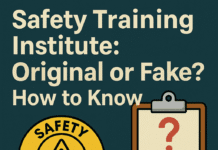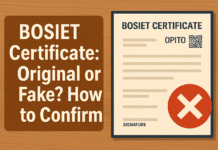
Certificate of Recognition Auditor Certification (COR): Ensuring Workplace Safety
Certificate of Recognition Auditor Certification : In today’s fast-paced and competitive business landscape, ensuring workplace safety has become a paramount concern for organizations across industries. The Certificate of Recognition (COR) Auditor Certification plays a pivotal role in this pursuit, helping companies maintain high safety standards and mitigate potential risks. In this article, we’ll delve into the significance of COR Auditor Certification, its benefits, the certification process, and how it contributes to fostering a safer work environment.
Introduction
Workplace safety is non-negotiable, and organizations are actively seeking ways to ensure the well-being of their employees while maintaining operational efficiency. The Certificate of Recognition (COR) Auditor Certification emerges as a beacon of assurance in this regard.
Understanding COR Auditor Certification
What is a Certificate of Recognition (COR)?
A Certificate of Recognition (COR) is an official document that verifies an organization’s commitment to maintaining a safe and secure work environment. It signifies that a company’s safety management system has been evaluated and found to meet the established standards.
The Role of COR Auditor Certification
COR Auditor Certification equips professionals with the expertise to assess and evaluate an organization’s safety protocols. These auditors play a critical role in determining whether a company qualifies for the COR, ensuring that safety practices are not just superficial, but deeply ingrained in the company’s operations.
Benefits of COR Auditor Certification
Enhanced Workplace Safety
COR Auditor Certification significantly elevates workplace safety by ensuring that safety measures are comprehensive, up-to-date, and effectively implemented. This certification encourages proactive hazard identification and risk mitigation.
Legal and Regulatory Compliance
By conforming to COR standards, organizations also ensure compliance with relevant safety laws and regulations. This certification minimizes legal liabilities and potential penalties arising from safety violations.
Reduced Operational Costs
Investing in safety through COR Auditor Certification can lead to reduced operational costs in the long run. Fewer accidents translate to fewer workplace disruptions, medical expenses, and insurance claims.
The Certification Process
Eligibility Criteria
To embark on the journey of COR Auditor Certification, individuals typically need a background in occupational health and safety, a strong understanding of safety regulations, and relevant auditing experience.
Training and Examination
Prospective auditors undergo specialized training that equips them with the knowledge and skills necessary for effective safety assessments. Subsequent examinations evaluate their comprehension and readiness.
On-Site Audit and Assessment
A crucial aspect of COR Auditor Certification is the ability to conduct on-site audits. Auditors assess various aspects of an organization’s safety protocols, from equipment maintenance to emergency response plans.
Importance of Regular Audits
Identifying Potential Hazards
Regular audits facilitate the identification of potential hazards that might otherwise go unnoticed. This proactive approach enables companies to address issues before they escalate into accidents.
Continuous Improvement
COR Auditor Certification promotes a culture of continuous improvement. Auditors not only identify shortcomings but also provide recommendations for enhancing safety protocols and practices.
COR vs. Traditional Safety Programs
Comprehensive Approach
Unlike traditional safety programs, COR Auditor Certification takes a comprehensive approach. It evaluates all aspects of safety management, from leadership commitment to employee training.
Credibility and Recognition
A COR-certified organization gains credibility and recognition within its industry. Clients, partners, and stakeholders view the certification as a testament to the company’s dedication to safety.
Implementing COR Auditor Certification
Top-Down Commitment
Successful implementation of COR Auditor Certification requires the commitment of top management. When leadership prioritizes safety, it sets the tone for the entire organization.
Employee Involvement
Involving employees in the safety process enhances its effectiveness. When workers actively participate in safety protocols, the overall safety culture becomes stronger.
Challenges and Solutions
Resistance to Change
Implementing COR Auditor Certification may face resistance from employees accustomed to traditional safety practices. Clear communication and education about the benefits can address this challenge.
Ongoing Maintenance
Maintaining COR Auditor Certification requires regular audits and updates to safety protocols. Companies must allocate resources for these ongoing efforts.
Measuring the Impact
Reduction in Incidents and Accidents
One of the most tangible impacts of COR Auditor Certification is a reduction in workplace incidents and accidents. This leads to a safer work environment and improved employee morale.
Positive Organizational Culture
COR-certified organizations often experience a positive shift in organizational culture. Safety-conscious employees feel valued and motivated to contribute to a secure workplace.
Conclusion
The Certificate of Recognition (COR) Auditor Certification stands as a symbol of an organization’s dedication to safety and employee well-being. In an era where workplace incidents can have far-reaching consequences, this certification empowers companies to proactively address safety concerns and foster a culture of vigilance.
NCSO Certification (National Construction Safety Officer)
Fire and Safety Course Government Colleges List
Urgent Requirement : HSE Officer and HSE Supervisor Jobs in Aarvi Encon
Urgent Requirement : HSE Officer Jobs in Oman
Urgent Requirement : HSE Officer and HSE Supervisor Jobs in KSA
FAQs
- What is COR Auditor Certification? COR Auditor Certification equips professionals to assess and evaluate an organization’s safety protocols for the Certificate of Recognition (COR).
- How does COR certification benefit companies? COR certification enhances workplace safety, ensures legal compliance, and reduces operational costs.
- Who can become a COR auditor? Individuals with a background in occupational health and safety and auditing experience can pursue COR Auditor Certification.
- Is COR certification industry-specific? No, COR certification is applicable across various industries, as safety is a universal concern.
























